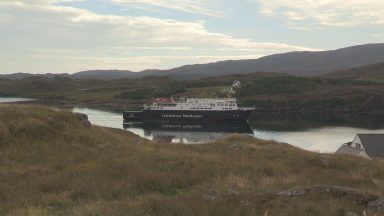The young son of a diver who perished at a shipwreck has been awarded £290,000 compensation after a judge ruled a ship captain didn’t do enough to minimise safety risks.
Lord Sandison awarded the sum to nine-year-old Vincent Warner in a judgement delivered on Friday at the Court of Session in Edinburgh.
His mother Debbie raised an action on Vincent’s behalf at Scotland’s highest civil court regarding how his dad Lex lost his life off Cape Wrath in the north coast of Scotland in August 2012.
Mr Warner, 50, from Sutton Coldfield, near Birmingham and a group of friends had been making a “deep water” technical dive off a wreck.
He was on board the MV Jean Elaine vessel in the hours before his death.
Both Vincent and Debbie sued the boat’s owners – Orkney based Scapa Flow Charters – for £500,000.
The case centred on how Mr Warner fell on board the MV Jean Elaine whilst walking in fins and sustained an abdominal injury. The diver later got into trouble when in the water.
Lawyers for the family claimed that the ship’s captain Andy Cuthbertson didn’t do enough to minimise the risks which came from divers walking on board boats whilst wearing fins.
Lawyers acting for Scapa Flow claimed that Mr Warner had a duty to walk across the deck carefully because he had fins on and was carrying heavy equipment.
In a judgment published on Friday, Lord Sandison agreed with the submissions made by the Warner family’s legal team. He said that the Marine Accident Investigation Branch had records of divers who had sustained accidents from walking in fins on board boats.
He wrote: “I accordingly conclude that Mr Cuthbertson was guilty of fault and neglect… in that he failed to recognise that the system of dive preparation he had set up or allowed to develop.. permitted or even encouraged divers to walk on deck in fins, and that that was an inherently risky activity to the extent that consideration should have been given to putting in place mechanisms apt to eliminate it or at least bring it under close control.
“The risk of a technical diver falling while walking in fins on deck was, as I have noted, well-recognised by the time of Mr Warner’s fall.
“The risk that such a fall might well cause injury ought also to have been appreciated, given that it would involve a diver laden with heavy and solid equipment coming into contact, quite possibly uncontrolled and hard contact, with an unyielding surface (be that the deck, the boat’s superstructure, or the equipment itself) without the benefit of any protective garb.
“The injury he in fact sustained can therefore properly be said to have arisen from or in connection with the fault and neglect of the defenders previously identified.”
His widow had previously sued on her own behalf but her claim was ruled to be time-barred.
However, judges at the UK Supreme Court ruled that Vincent could bring a compensation case.
During proceedings, the court heard how Mr Warner decided to dive after falling. The dive required complex, heavy equipment.
It was contended during the hearing that the decision to dive resulted in him experiencing increased levels of abdominal pain due to underwater pressure which in turn led to him rapidly ascending and his eventual death on August 14 2012.
During the action, Mr Warner was described as a very experienced, careful diver who would call off even if he had a “small sniffle”.
In his judgement, Lord Sandison said that Mr Warner died because while he was at depth of 80 metres below water, he became aware of abdominal pain.
Lord Sandison said this pain was “in consequence” of the “intra-abdominal haemorrhage suffered as a result of his fall on deck.”
The judge also said this pain caused Mr Warner to make an emergency ascension in an “anxious and ultimately panicked” state which affected his breathing.
Mr Warner then became unconscious and was unable to retain his breathing mouthpiece.
Lord Sandison added: “He became unconscious or otherwise unable to retain his breathing mouthpiece, which fell out of his mouth, causing him to drown. The injury suffered by him in the fall materially contributed to the sequence of events leading to his death.”
Lord Sandison said that Scapa Flow should have done more to eliminate the risks which came from walking on board in fins.
He added: “The overarching point is that no single and inflexible system of operation had to be implemented on every trip and regardless of individual circumstances, but that a system – whether using all or some of the possible expedients mentioned above, or others – ought to have been devised and executed on every trip so as to avoid, or at least minimise, the practice of technical divers walking on deck in fins.
“Had such a system for the promotion of safer fin practices been in place, the likelihood is that it would have performed its intended function of eradicating or minimising the risk of falling and that Mr Warner would not have fallen at all, or if he did, he would not have sustained a serious injury such as he in fact sustained, because the force of any fall would probably have been broken by him holding on to a handrail or being supported by the deckhand.
“The injury he in fact sustained can therefore properly be said to have arisen from or in connection with the fault and neglect of the defenders previously identified.
“I find that the defenders are liable to make reparation to the pursuer.
“The quantum of damages is agreed in the sum of £290,000.”
Follow STV News on WhatsApp
Scan the QR code on your mobile device for all the latest news from around the country


 iStock
iStock
























